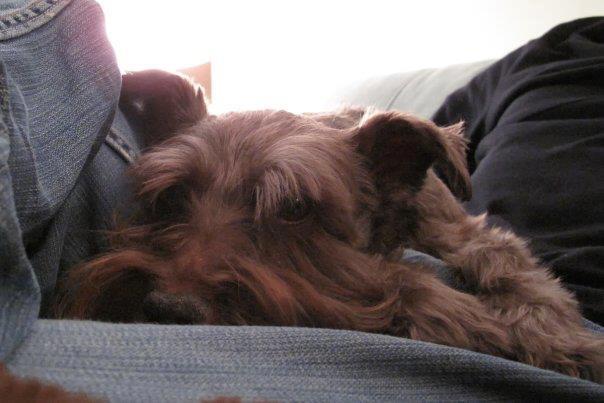Everyone who follows politics, or current events, must have read or heard about this. If not, you unfortunately have to read it to believe it; to fathom that this is not intentional farce, or satire, or an earnest deathbed confession from someone so consumed with guilt and regret that they desperately hope to reclaim some measure of their humanity. Nope, it’s exactly what it appears to be. Here’s the part that stays with me:
“I hated that dog,” Noem writes, adding that Cricket had proved herself “untrainable”, “dangerous to anyone she came in contact with” and “less than worthless … as a hunting dog”.
Hated that dog? This alone is something, in America, not many people (even the most shameless, soulless, and disgustingly opportunistic politicians) would feel comfortable admitting. But even then: one can imagine the next line being something along the lines of “when we found it another home there was relief all around” and we could chalk it up to someone who doesn’t get it (“it” here being many things, the Golden Rule foremost, but many other things, all of them enough to utterly disqualify one from being elected to higher office in a healthy democracy). But no:
“At that moment,” Noem says, “I realised I had to put her down.”
I’m relieved, I guess, to see that what this psychopath thought would be a brilliant anecdote to bolster her credentials for MAGA nation (and let’s leave aside the fact that this was even a possibility; that the perverse bragging of shooting a puppy would appeal to the “Cruelty is the point” party — and, if you’ve not yet read the piece that crystallized the origins of this expression, Adam Serwer deserves eternal praise for nailing it so succinctly, so completely) is resulting in bi-partisan pushback, and horror. At least there’s one thing most of us can agree on: dogs rule and enrich our lives beyond any reasonable metric. And: for those of us who have had to confront the agonizing, eventual, inevitable moment when we help our best friends pass on, there are no words other than sorrow and awe for what we’re losing, redeemed only by how much we received. For my #doglover friends, an excerpt from a longer piece about this love & loss.
Whispered Words
How long will it take? I did not ask, because I wanted to make every second count. It would be over quickly enough; it was already happening entirely too soon.
It’s okay, I said as I held my dog, flanked by friends and the friendly technicians who split their time between extending or improving lives and facilitating peaceful endings.
“He won’t feel any pain,” they assured me, and I knew it was the truth since this was not the first time I had found myself in this situation. Another dog, another occasion, and the excruciating decision to restrict pain by hastening death. Another time, at a place all dogs hate to go, perhaps because some part of them suspects that someday the person standing over them at the examination table will be the same one who administers that final injection.
I had already watched another small dog slowly go to sleep, just like they said he would. Barely moving when we carried him in, he snarled once the doctor reached for him: an instinctive gesture or perhaps a final, indignant affirmation (I am still alive!) and, as we covered him with kisses and kind words, the calm, considerate doctor reminded us that there would be no pain; it would, in fact, be quite pleasant. This stuff, he said, putting the needle down, would make our dog—could, in fact, make any of us—feel better than we’d ever felt, that this stuff was illegal, and expensive, on the streets.
Another day, different doctor, same drill. My dog’s heart was failing him. It was supposed to be a sluggish, gradual decline; the type you can sluggishly, gradually prepare for. But something had happened (I seem to recall words like torn and internal and bleeding) and my dog could scarcely breathe on his own when I brought him in. Seeing him, panting heavily and near panic in his tiny, oxygenated crate was as pitiful a sight I’ll hope to never endure again. I left the room so they could give me the diagnosis: it was dire and I had minutes, not hours, to make a decision. The moment my dog saw me as I rushed back into the room that default setting took over and all my own concerns evaporated.
(Stay strong, I did not need to tell myself, because I had been here before. I had looked down, yet another time, at another pair of eyes: impossibly lucid and beseeching, charging me to make sense of, or at least assuage, a kind of suffering that cannot be conveyed with words.
And once again I heard that reassuring phrase, or well-meaning mantra, that somehow articulated every hope, fear and aspiration a moment like this can contain. It will be okay, I said, smiling down at those eyes. Eyes I had looked into too many times to count, eyes that told me more about myself than anyone would believe, eyes that, until this moment, I could not imagine never being able to look at again.)
Okay.
It gets very quiet while time and place and the guarded feelings that enable us to function all fall away and you concentrate every thought into one simple, implausible objective: peace. You think it and you will it and for a moment that might be forever you become it in ways you’re never able to talk about later, even if you are inclined (and you aren’t, especially). You shiver but are calm; you are entirely in the present tense yet you are also somewhere else, somewhere deeper inside that, somehow, connects you to everything else you’ve ever known.
It will be okay, you whisper, actually believing this because it is not even your own voice you hear. You don’t know if this is you, or your mind, or the actualization of that otherplace (you are hazily aware) you have managed to access, understanding it is not anything you can anticipate or comprehend even though you have been preparing for it (you realize, abruptly) your entire life.
It’s okay, you say, and maybe your vision is blurred or your eyes are closed, or probably you are seeing more clearly than ever before, but now you recognize this voice and, as you look down at eyes that can no longer see you, understand, finally, that you are talking to yourself.
The complete piece, published in The Weeklings (RIP) in 2014, can be read here.


